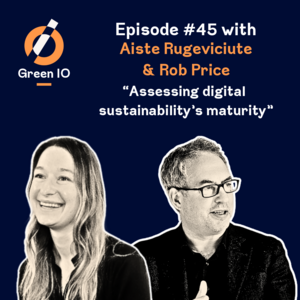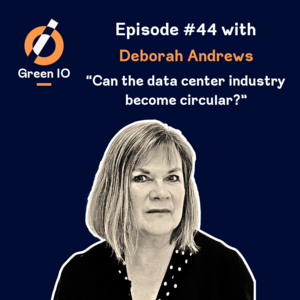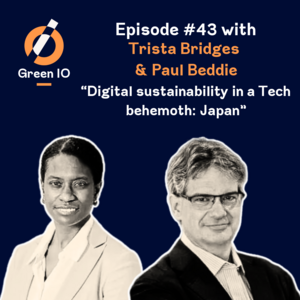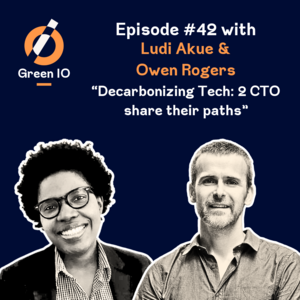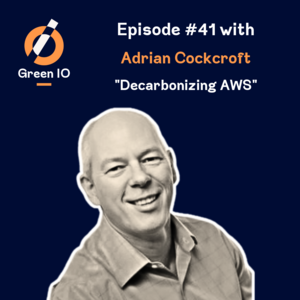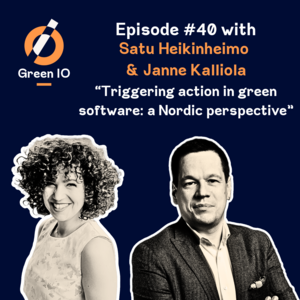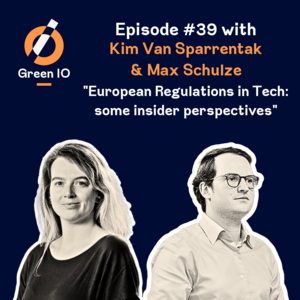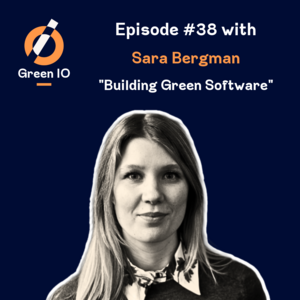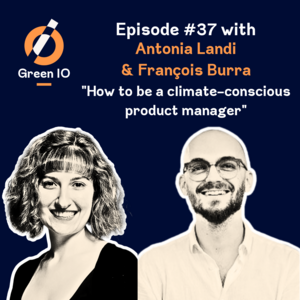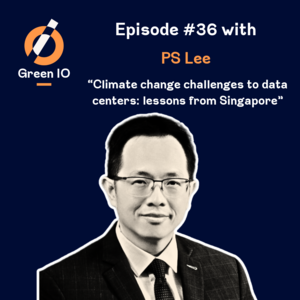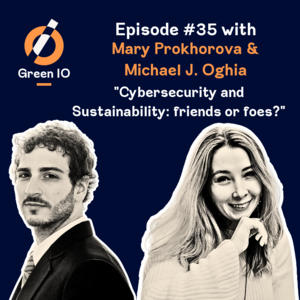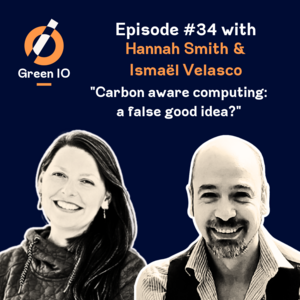#29 Cosmology and Technology with Maxime Blondeau
Update: 2023-12-05
Description
We don't always need a science-fiction device "à la Star Trek" to get transported somewhere else.
Discussing with Maxime Blondeau results in such a journey where I discover how anthropology, geography, and cosmology can help us understand better digital technologies and more specifically:
🤯 Why Digital Tech is not the first mind revolution humanity has gone through
🌪️ Why its magnitude will be as impactful as the previous ones
🗺️ How our representation of an over expanding digital world alters our perception of our material world
🧠 Why our attention is such a precious - and increasingly scarce - resource
🎁 Plus a breaking news shared by Maxime at the end of the episode!
📣 Before rushing to listen to this 29th episode, do not forget to book your ticket for the Green IO conference in Paris, December 8th.
Join us to get the latest insights on Digital Sustainability with Aurore Stéphant, Perrine Tanguy, Tristan Nitot, Julia Meyer, Theo Alves Da Costa, Pindy Bullar, Vincent Poncet, and more! Get also feedback from all the teams involved in the 2023 Sustainable Digital Challenge: Allianz, Axa, BlaBlaCar, BNP Paribas Cardif, Ekwateur, Evaneos, Groupama, INSEE, Leboncoin, Norauto, SNCF!
And it's free for our listeners! Register here with the voucher GREENIOVIP. We're looking forward to seeing hundreds of you there 😍.
❤️ Subscribe, follow, like, ... stay connected the way you want to never miss an episode!
❤️ Subscribe, follow, like, ... stay connected the way you want to never miss an episode!
📧 Once a month, we deliver carefully curated news on digital sustainability packed with exclusive Green IO contents in your mailbox, subscribe to the Green IO newsletter here.
🫴 Green IO is a free and independent podcast! And so we need your help to keep it that way by supporting us on Tipeee here.
Learn more about our guest and connect:
- Maxime's LinkedIn with its qualitative daily post followed by +100K people
- Gaël's LinkedIn and website
- Green IO website
📧 You can also send us an email at greenio@duez.com to share your feedback and suggest future guests or topics.
Maxime's sources and other references mentioned in this episode:
- Jack Goody’s book “The domestication of the savage mind”
- Maxime’s courses and conferences and all his resources and supports
Transcript
[00:00:00 ] Gaël quoting Maxime: "There is no contradiction, according to me, in using digital technology to perceive and represent infinity. But, we have to use it, and to see it, and to represent it, within constraints, the 1 and the 2. If we are seeing it and using it in the 1, 2, 3 infinity, then we're going to have problems, because the material world is limited..."
[00:00:32 ] Gaël: Hello, everyone. Welcome to Green IO, the podcast for responsible technologists building a greener digital world, one byte at a time. Our guests from across the globe share insights, tools, and alternative approaches, enabling people within the tech sector and beyond to boost digital sustainability. Before we start, a quick note for my European based listeners, you are invited to the Green IO conference in Paris on December the 8th. for free. I partnered with API days to bring you an amazing lineup, starting with Aurore Stéphant, Tristan Nitot, Théo Alves Da Costa, and all the teams involved in the 2023 sustainable digital challenge. The link to register is in the episode notes.
Our representation of the territory depends on our senses, our culture, the data we capture, but also the technical systems we choose. This is where cosmography, the graphic representation of the world, becomes essential to our existence. However, ecological disruption reflects a failure of our collective representation of the territory. This imbalance probably dates from the Neolithic revolution 12, 000 years ago. When we became sedentary, we built systems of exploitation and domination of a territory perceived as infinite.
In 2023, we are still mainly guided by this archaic mindset. This Maxime Blandeau quote powerfully resonated with me when I first read it, because this point set also drives our understanding of digital technology, which is seen as infinite and limitless by default, hence the use of the words cloud, universe, metaverse, Endless possibilities or the quest for infinite double digit gross This verbatim speaks volume about our digital tech cosmology and we should question ourselves, asking what could be a representation of digital technologies which enable a sustainable future for them?.
And for humankind I am a long-time fan of Maxime's work from his LinkedIn daily post of beautiful maps, to his course at the Paris Political Institute (Paris Science Po for my French listeners) which he decided to fully open source as he did for the. 40 plus conferences he gave on geography, technology and attention economy. He is also not a stranger to entrepreneurship, having co -founded a start-up, and I hope he will join the growing community of the French podcasters soon, and today it's an honor to have him on our show to take a huge step back and reflect on our collective understanding of digital technology.
Welcome Maxime, thank you for joining Green IO today.
[00:03:36 ] Gaël: Me as well. So, to put things in perspective, I mean, you post every day, including Sunday, on LinkedIn, a nice little text, I don't know how many, I think you're pretty close to hit the 1 million followers on LinkedIn, that's just insane, and this regularity, it's just amazing, I mean, I got it, like the blossoming and the richness of our world is a big source of inspiration, but how do you find the resources to produce qualitative content every day? I'm just amazed.
[00:03:42 ] Maxime: Well, I connect all my activities, the teaching, the entrepreneurship, the conference, the talks, I give and, the LinkedIn post. And the result is that some content come s to me, so almost every week I have readers contacting me, let's say 'I thought about you, here is a subject that you could add to'. So, in the end, it's like things are coming to me. I'm doing curation, of course, I rewrite, et cetera. But it seems that it's easier and easier to find your subject because, I mean, people want to share. And they also want to help me to find the right subject. So, in the end, I'm not alone to choose my subject every day, my daily topic.
[00:05:00 ] Gaël: The power of a community of committed people. That's one explanation. Now I'd like to ask you maybe to set the stage. I would love to ask you a simple and very complicated question. What can anthropology bring to our understanding of digital technology?
[00:05:18 ] Maxime: I'm a tech anthropologist, that is to say that I use anthropology, human science, to explore the relationship, very ancient, actually, relationship between, the way we build technical systems.
And the way we think, that's what anthropology can add to the understanding of a technical system in general, and a digital system in particular. So, I have a course at Sciences Po, but also at an engineering school called Mines Paris, PSR. It's one of the main engineering schools in Paris. And in Sciences Po, my course is programming the world, and I study how we program, that is to say, how we pre -write technical systems, technical structures. And how those technical structures program us in return, and how there is actually a link between how we define design, technical structures, infrastructure and superstructure and how it changes the way we develop perception. We develop attention to the world, because that's the place where technical systems, and culture meet and it creates a whole lot of belief systems. And that's what anthropology can bring to a better understanding of what's technical, and in particular these days, what digital systems do to the world.
[00:06:55 ] Gaël: And how massive is it? the destruction that digital technologies bring to the world, I mean is it just an evolution of some set of existing technologies, or is it something comparable to the reinvention of printing, because the Chinese had already known how to print centuries before the Europeans, or even the alphabet, what kind of level of disruption are we talking about when we are talking about digital technologies?
[00:07:25 ] Maxime: Well, there is a British anthropologist called Jack Goody, who was studying the effect of, graphic systems on, cultural mindsets, let's say, but particularly by studying, African population s in the seventies that had, at the time, never seen any scriptures, written characters. They were living in orality, and he developed a theory, by observing what it made to the
Comments
Top Podcasts
The Best New Comedy Podcast Right Now – June 2024The Best News Podcast Right Now – June 2024The Best New Business Podcast Right Now – June 2024The Best New Sports Podcast Right Now – June 2024The Best New True Crime Podcast Right Now – June 2024The Best New Joe Rogan Experience Podcast Right Now – June 20The Best New Dan Bongino Show Podcast Right Now – June 20The Best New Mark Levin Podcast – June 2024
In Channel


